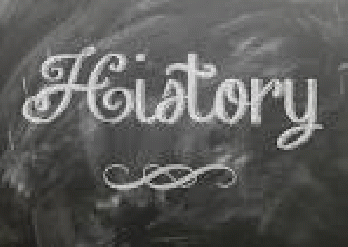The past is present, in people's minds, and it determines a lot of our present and of our future. Those who doubt it might have missed the following news in the past few weeks: members of the Nama and Herero communities of Namibia, whose parents suffered a genocide at the hands of the German colonial power (1904-1907) have filed a lawsuit in the US against Germany; France's supreme court has overturned a law barring non-French citizens from claiming reparations for damages and loss suffered in the Algerian independence war (1956-1962); in the US, a Smithsonian exhibition takes on Indian-related stereotypes as many Native American voices complain about enduring prejudice and president Trump's lack of understanding. I could add many examples drawn from individual conversations in the framework of my time with Initiatives of Change a NGO specializing in reestablishing trust across many of the world's divides: our sometimes limited knowledge and understanding of the past determines our identity, our perception of individual and collective threats and many of our attitudes.
In this context a most worrying trend is on the rise. It is well illustrated by the bill wich the Polish Government just had passed in Parliament which penalizes historical approaches of WWII it does not like. The Israeli Prime Minister and many of his cabinet ministers were vocal in their protests against what they saw as an attempt to deny historical facts about the Polish involvement in the Holocaust. In response, a group of Israeli MPs drew up draft legislation aimed at amending Israel's law on Holocaust denial to make it a crime punishable by jail to diminish or deny the role played by those who aided the Nazis in their persecution of Jews.
The increasing use of Law to deal with the past should be taken very seriously. In 2005 in France, a controversial law article specified that "the school programs recognize in particular the positive role of the French presence overseas, especially in North Africa (")". Then in 2011 the French parliament passed a law criminalizing the Armenian genocide's denial -- while the Turks have the opposite legislation. How can France and Turkey build a constructive relationship now that incompatible laws prevent them from making progress on some issues. What would happen worldwide if laws pitting groups against each other would become generalized?
The laws about the memory of the Jewish holocaust are specific as they are defending the internationally recognized historical truth, an international consensus that is widely supported including by key Muslim institutions such as the Muslim World League. Laws about unclear or disputed historical episodes are particularly regrettable, as they will prevent the international community from reaching any international consensus, and will eventually deprive the victims of the events of their right to know the truth.
In the same vein, there is distorted archeology. TheTurkish state is reported to slowly destroy its architectural Christian heritage (such as churches and cemeteries), paving the way for a denial that non-Turkish and non-Muslim cultures once existed on its territory, and the State of Israel is doing the same to parts of its heritage that are non-Jewish. The Taliban or Daech did that in a less subtle way in Afghanistan or in Niger, but it stemmed from the same urge to redefine History to suit a political agenda.
Such a trend makes you wonder whether international dialogue will still be possible in a few decades at least in a number of cases. On which basis will opposing parties be talking since a wholly different set of distorted or just fake facts will undergird their demands?
International institutions such as the United Nations cannot stay away from such issues, nor should the major diplomacies chose to ignore the risks attached to them.
In the framework of restorative justice, the United Nations has issued four rights for the victims of massacres or other mistreatments in conflicts: one of them, along with the right to justice, the right to reparation and the right to non-recurrence is the right to truth. It is the first, fundamental one. Should the right to truth not be made universal?
Truth on historical matters is established by historians relying on firsthand evidence contained in documents of all kind. International panels of historians relying on shared evidence should be working under the auspices of the United Nations to establish clear facts about alleged genocides, colonization and other international bones of contention. That would build as a reliable factual base from which to work for future reconciliations and international cooperation.
The European Union, whose main raison d'Ã �tre has been mutual understanding, reconciliation and peace, could do the same and try and produce a common fact-based view of its continent. Had the official history books not been at liberty to report distorted facts, would there have been such a quick and easy re-ignition of conflicts in post-Communist Balkans? It is perhaps not incidental that the only official common history book is Franco-German, produced by two states which have succeeded in creating a deep unity between them (unfortunately it has not really been used in schools, but the mere fact that its production was possible is a first step in the right direction.)
Going a little further, an international convention could enshrine the principles of truthfulness in historical matters and include a commitment to avoid "memorial laws" and rely on the international consensus for historical facts.
This idea will probably be found irritating by those who are actively manipulating History for their own purposes, which are unlikely to be peaceful. It would be tragic if it were found unpractical or unrealistic by those who care about peace in this world.
Antoine Jaulmes
Antoine Jaulmes is the President of Initiatives of Change Switzerland, a Swiss Foundation and NGO running a conference centre in Caux above Montreux delivering training and mediation since 1946, bringing together representatives of opposed communities, differing religious groups in order to foster trust, dialogue and peacebuilding.





